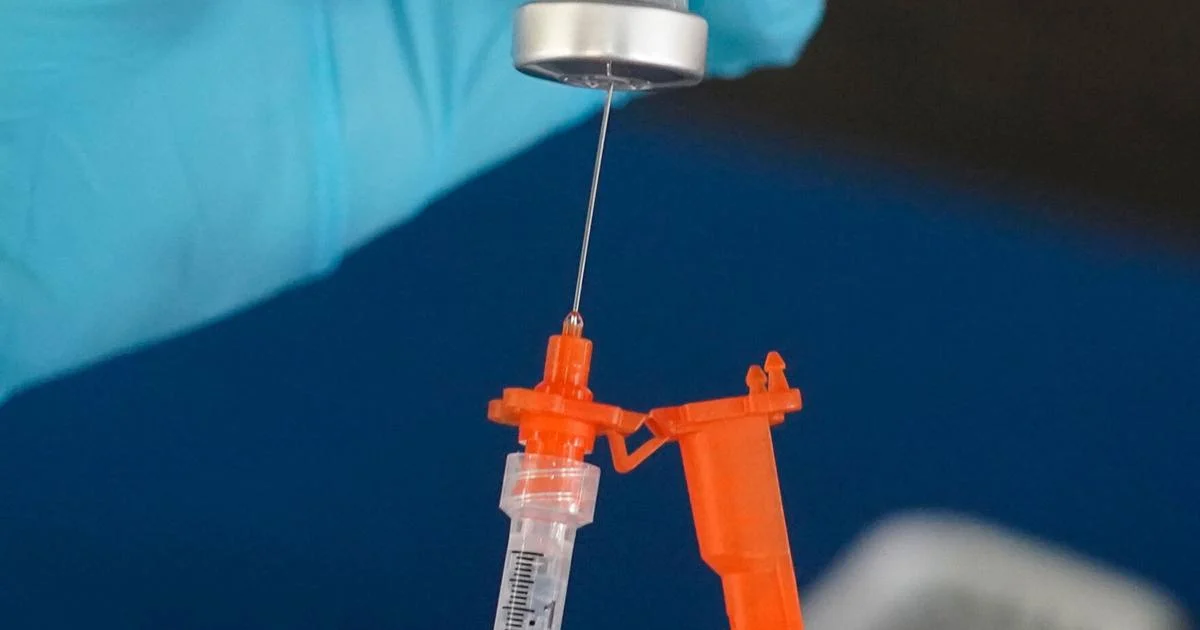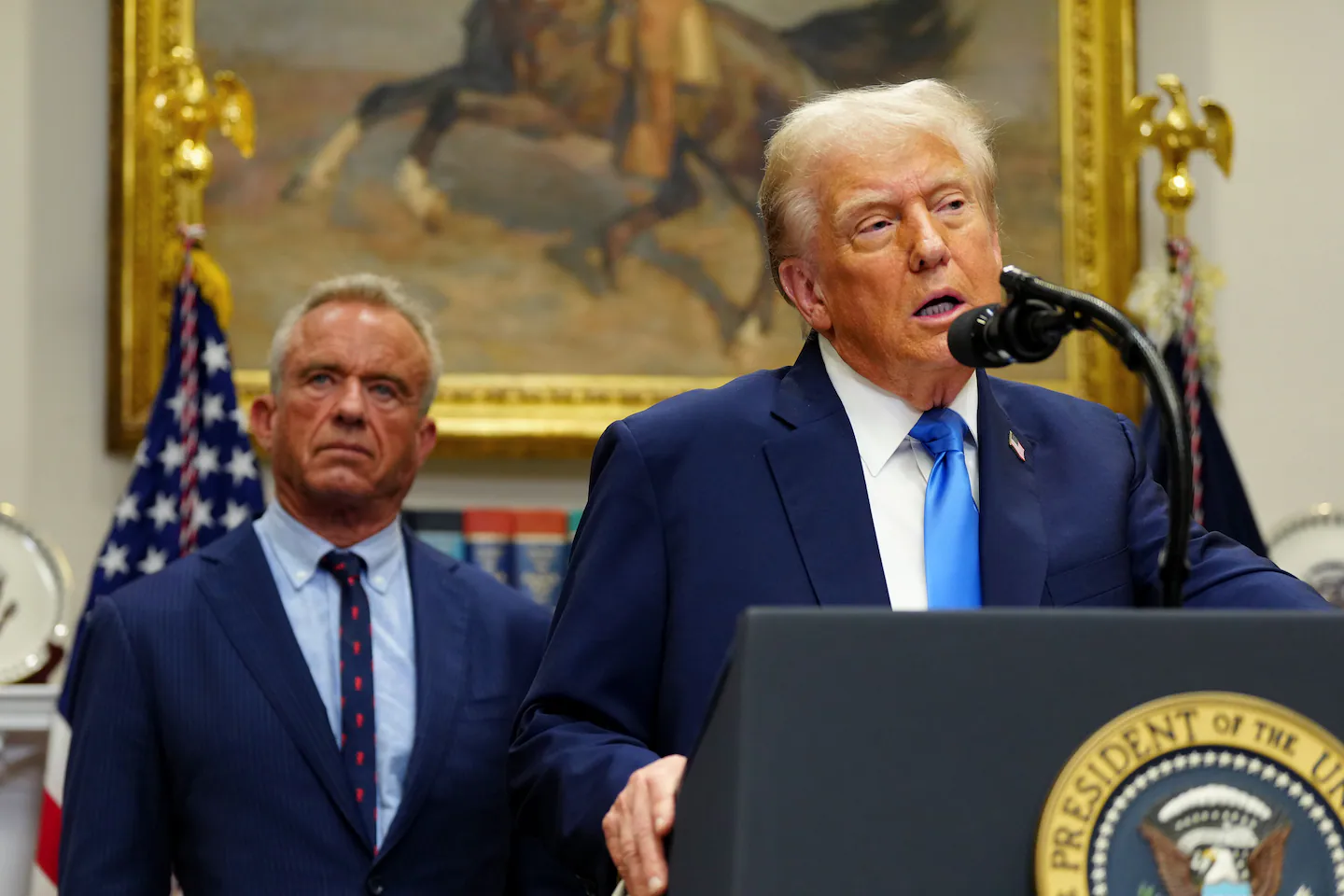
ST. LOUIS — Conflicting information from federal agencies about who should get an updated COVID-19 vaccine has led to confusion among those seeking — and administering — the dose, providers say.
The confusion stems from what is typically a seamless process of approving vaccines and how the Food and Drug Administration and the CDC, which establish guidelines for state agencies and pharmacies to follow, distributes them to the public.
Unsure how to proceed, pharmacies differ in how they are doling out the vaccine, updated to match the latest circulating strains of the COVID-19 virus, said Lisa Cox, spokeswoman for the Missouri Department of Health and Senior Services.
Some pharmacies are awaiting official sign-off on guidelines by the U.S. Centers for Disease Control and Prevention before providing the shots. Others are only providing the vaccine to people age 65 and older — sometimes requiring a prescription and sometimes not.
To give the shot to people under 65, some pharmacies require that the recipient check a box attesting that they have a high-risk medical condition making them eligible for the shot, while others require a doctor’s prescription.
Catherine Gilmore, a pharmacist at Beverly Hills Pharmacy in north St. Louis County, said many smaller, independent pharmacies like hers have opted not to even order COVID-19 vaccines.
“Because of the uncertainty of ‘Can we give it, can we not give it, who will get it, will we get in trouble if we give it to people who aren’t indicated?’ there are less pharmacies stocking the vaccine, so it may be harder to find,” Gilmore said.
Smaller pharmacies are also more apt to require prescriptions or proof of an underlying medical condition before giving the vaccine, Gilmore said. Whereas larger chain pharmacies like CVS and Walgreens simply have people attest they qualify.
DHSS officials encourage anyone interested in COVID vaccination to consult their doctor and call their pharmacy to check the availability and requirements, Cox said.
Conflicting recommendations
In August, the FDA approved the updated vaccine only for those age 65 and older and people younger than 65 with medical conditions that place them at high risk of COVID-19 complications.
But earlier this month, the Advisory Committee on Immunization Practices (ACIP), which advises the CDC on its vaccine guidelines, recommended allowing everyone 6 months and older to get un updated vaccine after a conversation with a health care provider.
The ACIP meeting itself was marked by confusion. The ACIP members were recently appointed by Health and Human Services Secretary Robert F. Kennedy Jr. after he fired the previous group. The new members have been criticized for their lack of expertise and promoting vaccine misinformation.
The CDC must still sign off on ACIP’s recommendations before they become official. The CDC was recently rocked by President Donald Trump’s firing of Director Susan Monarez and the resignation of several key staff. Monarez testified at a U.S. Senate hearing that Kennedy pressured her to pre-approve ACIP recommendations and fire career scientists, while Kennedy denies the account.
“There all of these things are combining right now to make a very sort of uncertain circumstance,” said Dr. Steven Lawrence, a Washington University infectious disease specialist at Barnes-Jewish Hospital.
The federal changes in guidelines come despite no change in the science surrounding the safety and efficacy of COVID-19 vaccines, he said. Previously, the vaccine was recommended for everyone 6 months and older.
Gilmore, who also serves as an assistant professor of pharmacy practice at the University of Health Sciences and Pharmacy in St. Louis, said the uncertainty has led to barriers to getting the vaccine.
“Because things are so up in the air, and the FDA says one thing and ACIP says something different, it’s changing from what we’ve been doing in the past,” Gilmore said. “It’s creating a lot of confusion for health-care providers, pharmacists and patients too — people who want to get a Covid vaccine.”
Missouri waits, Illinois doesn’t
About 18 states — including Illinois — have expanded and protected vaccine access by issuing blanket prescriptions, executive orders and insurance coverage requirements.
“Because there is a lack of alignment at the federal level, states are sometimes doing things on their own,” said Lawrence, of Washington University. “So, what is happening in Missouri, and what’s going to happen in Missouri over the next month, and how easy it is to get vaccines might be much different than say, how it is in Illinois.”
On Tuesday, the Illinois Department of Public Health released its own immunization guidelines for the fall respiratory virus season, after consulting with a statewide advisory committee of experts. It also issued a statewide standing order to ensure access to COVID-19 vaccines based on the guidelines.
“Illinois is stepping up at a critical moment,” said Tom Hughes, executive director of the Illinois Public Health Association. “With federal guidance creating uncertainty, the Illinois Immunization Advisory Committee and the department of public health are providing the clarity and leadership our residents and providers need.”
Cox said Missouri’s health department is waiting on official approval by the CDC on administration of the COVID-19 vaccine before moving ahead with any guidance for providers and the public.
“As we await more information from the CDC, we do not intend to issue a standing order in Missouri,” she stated in an email to the Post-Dispatch.
Questions have also swirled around paying for the vaccine. Recently, to ease concerns the America’s Health Insurance Plans, a trade association representing the health insurance industry, announced its member organizations would cover the updated COVID-19 vaccines; and Medicare and Medicaid made reassurances as well.
Requiring a prescription or consultation with a provider such as a doctor or nurse in order to get the vaccine may be too difficult for those who don’t have regular access to a doctor’s office or lack insurance, Lawrence said. “It adds a pretty significant barrier for many people.”
For most people, he said, staying up to date on vaccination reduces the risk of becoming infected and spreading it to others throughout the season, and in the long term it reduces the risk of serious illness.
“None of that has changed, but because these conversations are occurring, because of the misalignment in the recommendations, in and of itself, that causes confusion and it seeds uncertainty and doubts, even where people who didn’t have uncertainty or doubts before,” he said.
He and others fear the result will be fewer people protected from illness.
Dr. Rachel Orscheln, a Washington University pediatric infectious disease specialist at St. Louis Children’s Hospital, said differences between major policy-making agencies and health organizations — particularly when it comes to children — can be confusing for parents.
“And from confusion stems hesitancy, and then unfortunately, that results in a drop in vaccination uptake, which we require and need to protect everyone,” Orscheln said.
The American Academy of Pediatrics continues to recommend COVID vaccination for children ages 6 months to 23 months along with children between 2 and 18 years in certain risk groups, and any child whose guardian desires their protection from COVID.
Lawrence and others say the public can rely on major medical groups like the AAP and the American College of Obstetricians and Gynecologists and independent expert groups like the Vaccine Integrity Project, for information about vaccines.
“And talking to your local healthcare professional,” Gilmore said, “and not trusting social medial and not just whatever your next-door neighbor’s sister’s cousin’s brother says.”
Be the first to know
Get local news delivered to your inbox!
* I understand and agree that registration on or use of this site constitutes agreement to its user agreement and privacy policy.
Michele Munz | Post-Dispatch
Health reporter
Get email notifications on {{subject}} daily!
Your notification has been saved.
There was a problem saving your notification.
{{description}}
Email notifications are only sent once a day, and only if there are new matching items.
Followed notifications
Please log in to use this feature
Log In
Don’t have an account? Sign Up Today



